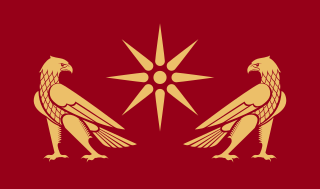Abgar usually refers to Abgar V, the King of Osroene with his capital at Edessa, ruled 4 BC-40 AD.
Abgar may also refer to:
Abgar usually refers to Abgar V, the King of Osroene with his capital at Edessa, ruled 4 BC-40 AD.
Abgar may also refer to:
This article concerns the period 29 BC – 20 BC.
Herod may refer to:
Year 53 BC was a year of the pre-Julian Roman calendar. At the time, it was known as the Year of the Consulship of Messalla and Calvinus. The denomination 53 BC for this year has been used since the early medieval period, when the Anno Domini calendar era became the prevalent method in Europe for naming years.

Abgar V, called Ukkāmā, was the King of Osroene with his capital at Edessa.

Osroene or Osrhoene was an ancient region and state in Upper Mesopotamia. The Kingdom of Osroene, also known as the "Kingdom of Edessa", according to the name of its capital city, existed from the 2nd century BC, up to the 3rd century AD, and was ruled by the Abgarid dynasty. Generally allied with the Parthians, the Kingdom of Osroene enjoyed semi-autonomy to complete independence from the years of 132 BC to AD 214. Though ruled by a dynasty of Arab origin, the kingdom's population was of mixed culture, being Syriac-speaking from the earliest times. The city's cultural setting was fundamentally Syriac, alongside strong Greek and Parthian influences, though some Arab cults were also attested at Edessa.

Edessa was an ancient city (polis) in Upper Mesopotamia, founded during the Hellenistic period by King Seleucus I Nicator, founder of the Seleucid Empire. It later became capital of the Kingdom of Osroene, and continued as capital of the Roman province of Osroene. In Late Antiquity, it became a prominent center of Christian learning and seat of the Catechetical School of Edessa. During the Crusades, it was the capital of the County of Edessa.

Jude was one of the Twelve Apostles of Jesus according to the New Testament. He is generally identified as Thaddeus, and is also variously called Judas Thaddaeus, Jude Thaddaeus, Jude of James, or Lebbaeus and is considered as the founding father and the first Catholicos-Patriarch of the Armenian Apostolic Church. He is sometimes identified with Jude, the brother of Jesus, but is clearly distinguished from Judas Iscariot, the apostle who betrayed Jesus prior to his crucifixion. Catholic writer Michal Hunt suggests that Judas Thaddaeus became known as Jude after early translators of the New Testament from Greek into English sought to distinguish him from Judas Iscariot and subsequently abbreviated his forename. Most versions of the New Testament in languages other than English and French refer to Judas and Jude by the same name.

Armenia, also the Kingdom of Greater Armenia, or simply Greater Armenia sometimes referred to as the Armenian Empire, was a kingdom in the Ancient Near East which existed from 331 BC to 428 AD. Its history is divided into the successive reigns of three royal dynasties: Orontid, Artaxiad and Arsacid (52–428).
Tiridates is a word of Iranian origin. It may refer to:
According to Eastern Christian tradition, Addai of Edessa or Thaddeus of Edessa was one of the seventy disciples of Jesus. He is possibly identical with Thaddaeus, one of the Twelve Apostles. From an early date his hagiography is filled with legends and fabrications. The saint himself may be entirely fictitious.

The Monastery of Saint Thaddeus is an ancient Armenian monastery in the mountainous area of West Azerbaijan Province, Iran. It is believed to be one of the oldest church buildings in the world.

Utik was a historic province of the Kingdom of Armenia. It was ceded to Caucasian Albania following the partition of Armenia between Sassanid Persia and the Eastern Roman Empire in 387 AD. Most of the region is located within present-day Azerbaijan immediately west of the Kura River, while a part of it lies within the Tavush province of present-day northeastern Armenia.
The origin of the Armenians is a topic concerned with the emergence of the Armenian people and the country called Armenia. The earliest universally accepted reference to the people and the country dates back to the 6th century BC Behistun Inscription, followed by several Greek fragments and books. The earliest known reference to a geopolitical entity where Armenians originated from is dated to the 13th century BC as Uruatri in Old Assyrian. Historians and Armenologists have speculated about the earlier origin of the Armenian people, but no consensus has been achieved as of yet. Genetic studies show that Armenian people are indigenous to historical Armenia, showing little to no signs of admixture since around the 13th century BC.

The Parthian war of Caracalla was an unsuccessful campaign by the Roman Empire under Caracalla against the Parthian Empire in 216–17 AD. It was the climax of a four-year period, starting in 213, when Caracalla pursued a lengthy campaign in central and eastern Europe and the Near East. After intervening to overthrow rulers in client kingdoms adjoining Parthia, he invaded in 216 using an abortive wedding proposal to the Parthian king Artabanus's daughter as a casus belli. His forces carried out a campaign of massacres in the northern regions of the Parthian Empire before withdrawing to Asia Minor, where he was assassinated in April 217. The war was ended the following year after Parthian victory at the Battle of Nisibis, with the Romans paying a huge sum of war reparations to the Parthians.
Kingdom of Armenia may refer to:
The Abgarid dynasty was a dynasty of Nabataean Arab origin. Members of the dynasty, the Abgarids, reigned between 134 BC and 242 AD over Edessa and Osroene in Upper Mesopotamia. Some members of the dynasty bore Iranian names, while others had Arab names, including Abgar itself. J.B. Segal notes that the names ending in "-u" are "undoubtedly Nabatean". The Abgarid dynasts spoke "a form of Aramaic".
Apcar or Abgar is an Armenian name that may refer to the following notable people;